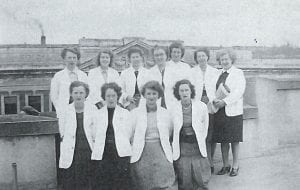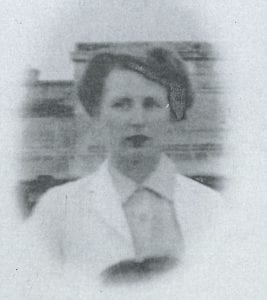This biography is based on an interview with Maire’s daughter, Alison Smith, in 2019 for the Early Medical Women of New Zealand Project
“She wasn’t a person that liked to look backwards, she never really told many stories about her younger days, you used to have to drag things out of her.”
Contents [hide]
Early years: the grandfather clock
Maire Jean Tait was born in 1923 in Poroutawhao, and her family later moved to a farm in Levin located off State Highway 1. Maire was a very intelligent girl who was awarded dux of her school twice, in both 1938 and 1939. She achieved her university entrance when she was just fifteen and a half—too young to attend university—so she completed another year of secondary school before moving to Wellington for her medical intermediate studies.
Maire’s interest in medicine was unusual in her farming family, none of whom had been to university.
“She just had this early fascination with the human body… Apparently, she expressed her desire to be a doctor from the age of five, so I don’t know what caused that. But she always, as a kid, thought it would be good if humans had, like a grandfather clock, they had an opening, like a cupboard that opened in your stomach so you could see what was going on. I think she was just completely fascinated by it.”
A woman in medical school
Maire was one of about twenty women in her year, of whom fourteen later went on to graduate. In some ways, medical training during the war was advantageous for women, as men were recruited overseas, freeing up spaces at medical school. However, despite the relatively large proportion of women in her class, Maire was forward thinking enough to realise that the war may have had other detrimental effects on the quality of her medical school education.
“One thing she did say about her medical training was that it was kind of already old fashioned. She reckoned that they didn’t get new textbooks during the war or anything, so all her medical studies which took place during and just after the war were all pre-war stuff. So she always felt that she didn’t get the best education that she could have.”
During her studies, Maire would work as a fruit picker in Nelson during the long summer holidays to make some money. She particularly enjoyed outdoor pursuits, such as skiing and tramping, probably as part of an organised group. She wasn’t a particularly social person, and although she maintained life-long friendships with some of her fellow medical students, they were not particularly close relationships. She disliked gossip and was no good at small talk.
“She was a perfectly pleasant person, she would have just had nothing in common with anyone, I think, was basically what it was. She never really talked about friends, you know. She did know lots of people, obviously, through med school. But they didn’t seem to be close friends.”
Maire never really commented on any difficulties she may have faced as a woman in medical school. However, she did later write a letter about a medical school reunion she attended in the 1980s. “What was the deal with the cufflinks and brooches” she writes, referring to how the medical men were given cufflinks while the medical women were grouped together with the wives and given brooches, yet the husbands of the female doctors were not given cuff-links because they weren’t doctors. She also commented on the ‘boy’s club attitude’ that prevailed amongst the group.
“The chairperson said how great it was to see all the chaps of the 1947 graduation or something. And she was sitting at the table of the women graduates, and they were all saying, well we feel a bit excluded by that. You know, we’re not chaps.”
Career as a wife, mother, and general practitioner
Maire completed her final year of training in Dunedin before graduating in 1947. She then went to Hawkes Bay, Gisborne, and then Wellington to begin her working career. Here, her fascination in the human body that she had held as a small child led to an ambition for a surgical specialty. However, this was short-lived.
“Apparently, she had been wanting to do surgery, and she was going off to London to study, she had her trunk packed and everything, and then she met my father and they met and married very quickly, like within three months, so she never made it to London.”
Maire was working as a locum for a Dr Erenstrom, when she met her future husband, William Guy Smith (known as Guy) at a party. Guy was a lawyer who had already sacrificed several years of his career overseas in the Navy during the war, and for this reason, the couple decided to stay in New Zealand, where Maire instead became a general practitioner.
“She was so besotted with my father that I don’t think she ever regretted it.
The two were well suited to each other. While Maire helped Guy break through his rigid thinking, he helped her to socialise with others, and the couple would often talk through new ideas together. They bought one house in Seatoun, then built one in Wilton, the latter with a surgery at the bottom that was connected to the house, by internal stairs but which had its own entrance for patients. Maire would see patients there, assisted by a nurse.
About two years later,w Maire and William had their first of six children together. After the third child was born Maire stopped working in her own surgery, although she continued to work one day a week at Wellington’s Northland Medical Centre with Dr. Treadwell. Instead she spent most of her time raising her children, which may have presented new challenges for her.
“I think she found life pretty hard as a suburban housewife, because she wasn’t really interested in coffee mornings and talking about gossip and whatever, she was always quite interested in science and the latest this and that and the other thing. So she didn’t really fit in with the other women around her.”
Maire had an eccentric personality and growing up with her as a mother was both fascinating and challenging for her children. Her daughter Alison was a great feminist in her teenage years and thought it was “pretty neat” that her mother was a doctor. Maire would often encourage ideas and discussions at the dinner table, stimulating some healthy family debate. On the other hand, despite her medical knowledge, her children often felt their health was somewhat neglected, as Maire didn’t like to use Bandaids or Dettol like all the other mothers, and instead relied on soap and fresh air. —She was quite conservative in her social outlook during her earlier years, making her dismissive of the possibility of any homosexuality in the family, and her devotion to her husband perhaps distracted her from her children’s lives, education and emotional development.
Sadly, Maire’s husband passed away unexpectedly at the age of 53, while overseas, during the couple’s second honeymoon and while celebrating Guy’s promotion as president of the Law Society. Guy and Maire were hiking in Berchtesgaden with another couple when Guy suffered a heart attack and a fall, breaking his neck on the way down. This was a traumatising experience for Maire, although she was not one to cry and show her emotions.
“Mum gave him heart massage for an hour before the mountain rescue team got there, and then they kept him on a machine for another hour, and then she said turn it off, “That’s not my husband.” And yeah, so that was pretty tough I think.”
Later in life: returning to work and developing new ideas
At the age of 51, Maire found herself widowed with six children. Supported with only a day’s work, albeit some insurance money, she started working part time as a doctor at Wellington Teachers Training College. Juggling work and motherhood would have been challenging, and Maire’s youngest son—only six years old—probably spent some time home alone after school. Without her husband to bolster her socially, Maire may have found herself living more independently than she had before.
“Dad was the sort of outgoing one, and mum was always happy to join in, but she would not initiate. She was like that the rest of her life, didn’t really initiate stuff but always happy to see people or join in with something.”
As the years progressed, Maire’s eccentric personality strengthened. Disillusioned with conventional medicine, she became preoccupied with the ‘physics of emotion’—the idea that one’s emotions can affect your physical well-being. She believed that drugs often were unnecessary, and that people could fix themselves through dealing with their emotions. Maire was wrought by a persistent desire to change the world with these ideas. She filled notebooks with her thoughts, and wrote to presidents and prime ministers internationally, hoping that her theory could solve everything that was wrong with the world.
“She wrote to lots of world leaders… she was always commenting on everything. She was so fixated on it she would talk about nothing else, and that just made people avoid her I think, later on.”
Although this may have revealed her own difficulties with social interactions and reading emotions in others, her ideas came from a place of hope and a desire for change, and her family are proud of all her achievements.
“We’re all very proud that she was a doctor because it was unusual.”


